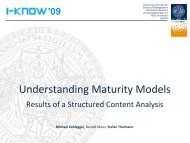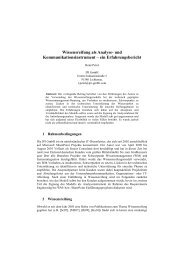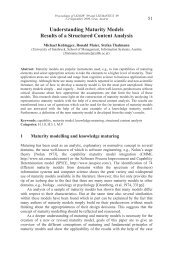MATURE Deliverable 1. - Knowledge Maturing
MATURE Deliverable 1. - Knowledge Maturing
MATURE Deliverable 1. - Knowledge Maturing
Create successful ePaper yourself
Turn your PDF publications into a flip-book with our unique Google optimized e-Paper software.
3 Ethnographic Study<br />
The ethnographic study has been targeted to investigate the state-of-practice at <strong>MATURE</strong> partner<br />
organizations from a knowledge maturing perspective in order to inform the design activities as early as<br />
possible. Section 3.1 presents the objectives of the study. Section 3.2 reflects on the academic background<br />
of the ethnographic study. Section 3.3 reports on the procedure taken and the methods applied. Section<br />
3.4 discusses limitations of the study. Appendix 8.1 gives an overview of the individual studies that have<br />
been performed, i.e. teams of ethnographers working with individual <strong>MATURE</strong> partner organizations, in<br />
the form of fact sheets about the studies.<br />
3.1 Objectives<br />
The main objective is an in-depth investigation of the processes, habits, cultures, social interactions, etc.<br />
of knowledge maturing within our application partners and selected associate partner organizations.<br />
The investigation aims at identifying relationships between personal tasks at work, creation of personal<br />
knowledge, determination and fulfilment of learning demands, processes of learning and knowledge<br />
sharing within communities, institutionalisation of community knowledge on the organisational level as<br />
well as managerial instruments targeted at influencing these processes. The study also yields current<br />
barriers and problems. First hand experiences which could be useful for design activities should be<br />
gathered by involving developers into the ethnographic study<br />
Furthermore, an aim is to identify maturity stages of knowledge in organisations and to explore current<br />
knowledge routines, processes and types in the scope of knowledge maturing.<br />
3.2 Background<br />
Ethnographical research established in anthropology and social science was developed to investigate new<br />
cultures and social settings. Fetterman describes ethnography as “the art and science of describing a group<br />
or culture” (Fetterman, 1999). In this sense, first ethnographers like (Malinowski, 1922) discovered exotic<br />
islands and cultures to describe them in monographs. Social scientists started to use ethnography to<br />
describe social hot spots, like cities with a large portion of unemployed people (Jahoda et al., 1933) or the<br />
growing suburbs (Park et al., 1925). In order to allow a detailed description of cultures and social settings,<br />
more than simple observation is necessary. The key characteristic of ethnography is active participation in<br />
social settings to understand why things happen (Lamnek, 2005, Jordan, 1996, Fetterman, 1999). In<br />
contrast to field observation which describes what happens, ethnography focuses also on the why and how<br />
things happen.<br />
The researcher tries to become a member of the community by working with people in their natural<br />
environments, typically for long periods of time (Fetterman, 1999). In fact, researchers never become<br />
members in the same sense (Emmerson et al., 1995), but nevertheless motivations and intensions of<br />
observed actions can be described (Lamnek, 2005). Usually, the researcher performs activities that are<br />
central for the lives of those studied and as he/she participates he/she also influences the observed<br />
environment. The effects of the ethnographer’s participation, often called “consequential presence”,<br />
cannot be avoided, but the ethnographer should be aware of them (Emmerson et al., 1995).<br />
Openness, especially for uninteresting-acting situations is one of the key success factors in ethnographic<br />
research (Fetterman, 1999, Lamnek, 2005). Theories should not be validated by ethnography. Rather,<br />
theories should be inductively derived from the gathered data. That does not imply any lack of rigor and<br />
the researcher is guided by hypotheses and ideas, but he should be aware of its estimations (Fetterman,<br />
1999).<br />
It is unusual to use formal questionnaires or predefined questions, instead, informal interviews<br />
(“conversations”) or questions asked on-the-fly, as they arise in actual situations are typically used<br />
(Jordan, 1996). That again does not imply unsystematic procedure. Furthermore, it has to be ensured that<br />
data is gathered systematically and not haphazardly (Jordan, 1996), (Harper, 2000). Due to the uniqueness<br />
of social settings, in our case organizations, and the situational character of ethnography, it is practically<br />
12







